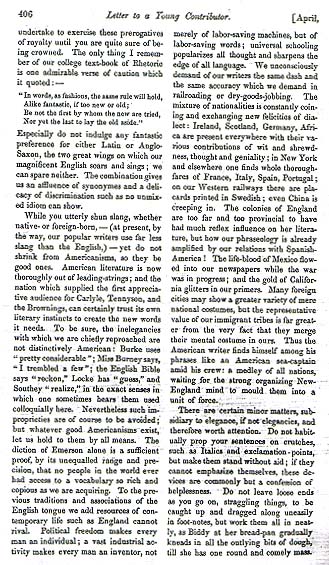Manuscript:

Transcription:
undertake to exercise these prerogatives of royalty until you are
quite sure of being crowned. The only thing I remember of our
college text-book of Rhetoric is one admirable verse of caution
which is quoted:--
"In words, as fashions, the same rule will hold,
Alike fantastic, if too new or old;
Be not the first by whom the new are tried,
Nor yet the last to lay the old aside."
Alike fantastic, if too new or old;
Be not the first by whom the new are tried,
Nor yet the last to lay the old aside."
Especially do not indulge any fantastic preference for either Latin
or Anglo-Saxon, the two great wings on which our magnificent
English soars and sings; we can spare neither. The combination
gives us an affluence of synonymes and a delicacy of discrimination
such as no unmixed idiom can show.
While you utterly shun slang, whether native- or foreign-born,
--(at present, by the way, our popular writers use far less slang
than English,)--yet do not shrink from Americanisms, so they be
good ones. American literature is now thoroughly out of leading-
strings; and the nation which supplied the first appreciative
audience for Carlyle, Tennyson, and the Brownings, can certainly
trust its own literary instincts to create the new words it needs.
To be sure, the inelegancies with which we are chiefly reproached
are not distinctively American: Burke uses "pretty considerable";
Miss Burney says, "I trembled a few"; the English Bible says
"reckon," Locke has "guess," and Southey "realize," in the exact
senses in which one sometimes hears them used colloquially here.
Nevertheless such improprieties are of course to be avoided;
but whatever good Americanisms exist, let us hold to them by all
means. The diction of Emerson alone is a sufficient proof, by its
unequalled range and precision, that no people in the world ever
had access to a vocabulary so rich and copious as we are
acquiring. To the previous traditions and associations of the
English tongue we add resources of contemporary life such as
England cannot rival. Political freedom makes every man an
individual; a vast industrial activity makes every man an inventor,
not merely of labor-saving machines, but of labor-saving words;
universal schooling popularizes all thought and sharpens the
edge of all language. We unconsciously demand of our writers
the same dash and the same accuracy which we demand in
railroading or dry-goods- jobbing. The mixture of nationalities is
constantly coining and exchanging new felicities of dialect: Ireland,
Scotland, Germany, Africa are present everywhere with their
various contributions of wit and shrewdness, thought and geniality;
in New York and elsewhere one finds whole thoroughfares of
France, Italy, Spain, Portugal; on our Western railways there
are placards printed in Swedish; even China is creeping in.
The colonies of England are too far and too provincial to have
had much reflex influence on her literature, but how our
phraseology is already amplified by our relations with Spanish
-America! The life-blood of Mexico flowed into our newspapers
while the war was in progress; and the gold of California glitters
in our primers. Many foreign cities may show a greater variety
of mere national costumes, but the representative value if our
immigrant tribes is far greater from the very fact that they merge
their mental costume in ours. Thus the American writer finds
himself among his phrases like an American sea-captain amid
his crew: a medley of all nations, waiting for the strong organizing
New-England mind to mould them into a unit of force.
There are certain minor matters, subsidiary to elegance, if not
elegancies, and therefore worth attention. Do not habitually
prop your sentences on crutches, such as Italics and exclamation
points, but make them stand without aid; if they cannot emphasize
themselves, these devices are commonly but a confession of
helplessness. Do not leave loose ends as you go, straggling
things, to be caught up and dragged along uneasily in foot-notes,
but work them all in neatly, as Biddy at her bread-pan gradually
kneads in all the outlying bits of dough, till she has one round
and comely mass.



